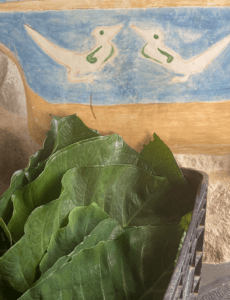![[:en]Taioba: The Green Treasure of Agroforestry[:br]Taioba: O Tesouro Verde da Agrofloresta[:sp]Taioba: El Tesoro Verde de la Agroforestería[:] 2 taioba 8430](https://ecocaminhos.com/wp-content/uploads/2024/04/taioba_8430-828x520.jpg)
Taioba, a  leafy green native to South America, is a key player here at Eco Caminhos farm due to its health benefits and usefulness within agroforestry. This plant can be found in kitchens across Brazil, Africa, and Trinidad and Tobago. In this article, we will explore the wonders of taioba, from its ecological role to its culinary applications.
leafy green native to South America, is a key player here at Eco Caminhos farm due to its health benefits and usefulness within agroforestry. This plant can be found in kitchens across Brazil, Africa, and Trinidad and Tobago. In this article, we will explore the wonders of taioba, from its ecological role to its culinary applications.

Taioba and the Agroforestry System
Taioba (Xanthosoma sagittifolium) serves various functions within agroforestry systems. Amidst the diversity of plants, taioba not only thrives, but also helps maintain soil moisture and protect against erosion, thanks to its large leaves. Taioba leaves act as a living mulch, helping to keep the soil fluffy and moist. This characteristic is essential for protecting tree roots and providing shade for small coffee seedlings, creating a more favorable environment for their initial development. Its presence contributes significantly to the health of the ecosystem, promoting biological diversity and agricultural sustainability.
In the pictures to the right you can see our agroforestry systems (SAF) at different stages. In the newly planted SAF (left), it is easy to see how taioba creates shade for the coffee seedling below. The more mature SAF (right) shows inhame which serves a similar role as the taioba amongst a larger diversity of more mature plants. Be warned that the inhame leaf, while similar in appearance and function within agroforestry to the taioba, is not safe for consumption; however, inhame root is edible and delicious.
Health Benefits & Preparation
In addition to its functions within an agroforestry system, taioba is a rich source of essential nutrients. Rich in vitamins A and C, calcium, and iron, taioba offers significant health benefits, including strengthening the immune system, promoting eye health and maintaining healthy bones and teeth. Furthermore, its low calories make it an excellent food to include in balanced diets.
However, taioba requires proper preparation because it contains oxalic acid. Oxalic acid is also found in foods like spinach and other leafy green vegetables. When consumed in large quantities, oxalic acid can cause irritation to the mucous membranes. Proper preparation of taioba, mainly through cooking, nullifies these adverse effects, making it safe for consumption. Traditionally taioba leaves are consumed cooked in stews, soups, or pies. When cooked, this leafy green has a mild and pleasant flavor.
Taioba Refogada (Stir-fry) Recipe
Ingredients:
- 1 bunch of taioba (1o leaves)
- 2 cloves of garlic
- 2 tablespoons of olive oil
- Salt to taste
Steps:
- Wash the leaves well under running water to remove any dirt or residue.

- Remove the stalk and cut into strips or pieces.

- Saute garlic in olive oil over medium heat until fragrant.

- Add in the taioba and salt to taste.

- Stir occasionally, until the taioba has reduced to about half of its original volume.

- After the taioba has reduced to 50% of its original volume, turn the heat to low.

- When the taioba has cooked down to a texture reminiscent of cooked spinach, it’s ready to serve and enjoy!

![[:en]Eco Caminhos: Permaculture & Agroforestry Farm in Brazil[:br]Eco Caminhos: Fazenda de Permacultura e Agrofloresta no Brasil[:sp]Permacultura y Agroforestería en Brasil: Eco Caminhos[:]](https://ecocaminhos.com/wp-content/uploads/2024/02/Eco-Caminhos-logo-without-border.png)

 Português
Português Español
Español

![[:en]ECOLIBRIUM, LATEST NEWS FROM THE FARM[:br]ECOLIBRIUM, ÚLTIMAS NOTÍCIAS DA FAZENDA[:sp]ECOLIBRIUM, ÚLTIMAS NOTICIAS DE LA GRANJA[:] 14 Araca Project](https://ecocaminhos.com/wp-content/uploads/2026/02/WhatsApp-Image-2026-01-30-at-9.03.15-AM-1-500x344.jpeg)
![[:en]Highlights from November and December 2025[:br]Destaques de Novembro e Dezembro 2025[:sp]Resumen de Noviembre y Diciembre 2025[:] 15 voluntariado grego, bioconstrução, telhado verde, ecolibrium, intercâmbio jovem.](https://ecocaminhos.com/wp-content/uploads/2025/12/IMG-20251230-WA0040-1-500x344.jpg)
![[:en]October Highlights: Volunteering, Ecotourism, and Sustainable Projects[:br]Destaques de Outubro: Voluntariado, Ecoturismo e Projetos Sustentáveis[:sp]Lo Más Destacado de Octubre: Voluntariado, Ecoturismo y Proyectos Sostenibles[:] 16 20251025 141712 1](https://ecocaminhos.com/wp-content/uploads/2025/11/20251025_141712-1-500x344.jpg)